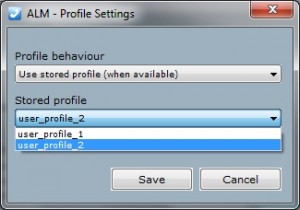Multiple Device Profiles for Extension Mobility
When using Extension Mobility, a user may need multiple device profiles to use different Cisco IP Telephone types. ALM supports this.
What is a device profile?
A device profile comprises the set of attributes (services and/or features) that are associated with a particular device. Device profiles include name, description, phone template, add-on modules, softkey templates, feature settings, multilevel precedence and preemption (MLPP) information, directory numbers, subscribed services, and speed-dial information.
You can assign the user device profile to a user, so, when the user logs in to a device automatically via ALM, the user device profile that you have assigned to that user loads onto that device as a default login device profile. After a user device profile is loaded onto the phone, the phone picks up the attributes of that device profile.
Extension mobility and multiple device profiles
When multiple device profiles are associated to one user, because the user logs on to different phone types or on different locations, maybe even for different traffic classes or other features, ALM allows you to select the preferred device profile based on the physical phone detected or ALM will present the user with list of profile found. As a result the user does not have to enter any digits or navigate on the phone and it simplifies the logon process.
Examples of the use of multiple device profiles
Examples when to use multiple profiles:
- one user who logs on to different phone models
- two users sharing one desk phone
- a user moving between two or more locations
ALM Pro:


ALM Pro+:


ALM Express:



